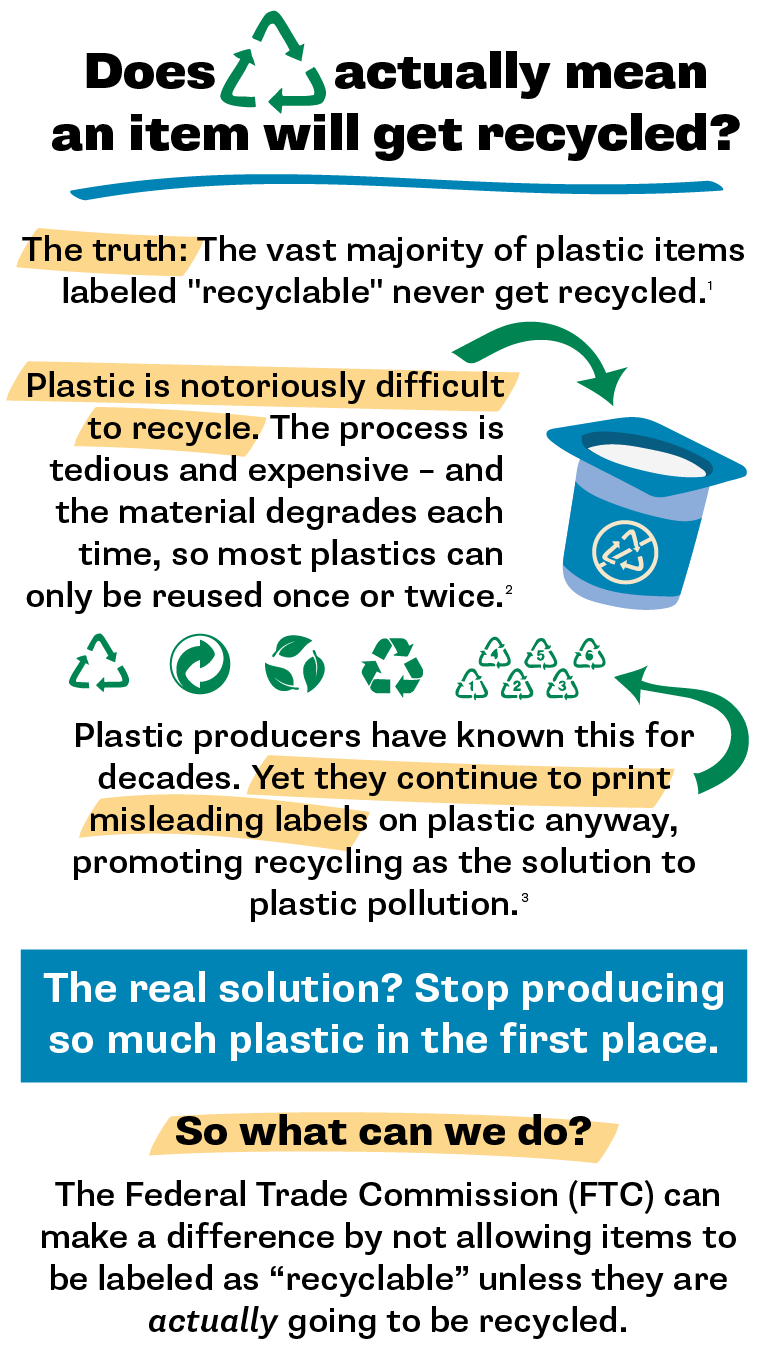
John,
You've probably seen it more times than you can count: That triangular chasing arrows symbol on the bottom of your yogurt container or plastic water bottle, sometimes accompanied by the word "recyclable."
But what does "recyclable" actually mean? The truth is, as counter-intuitive as it sounds, it doesn't always mean the item in your hand will end up getting recycled.
And that's part of a bigger problem.

Whales are washing up on beaches with bellies full of plastic.4 We're finding microplastics in our nation's farms, clustering around plant roots and reducing crop yield.5 Plastic is showing up everywhere from the highest mountain peak in the world to the air that we breathe.6,7
We can't recycle our way out of this -- especially when plastic producers are misleading us about how recyclable plastics really are.
If we want to address the devastating impacts plastic has on our health and environment, we have to go to the source. That means reducing the amount of plastic we produce in the first place.
We can start by regulating the labels that go on our plastic products -- so that "recyclable" doesn't appear on anything we know is only destined for the landfill.
Thank you,
Faye Park
President
P.S. We're working on real solutions to our plastic pollution crisis. Will you donate today and join our work to hold polluters accountable, reduce plastic pollution and more?
1. Saabira Chaudhuri, "Your 'widely recyclable' plastic yogurt tub is rarely recycled," The Wall Street Journal, August 17, 2022.
2. Saabira Chaudhuri, "Your 'widely recyclable' plastic yogurt tub is rarely recycled," The Wall Street Journal, August 17, 2022.
3. Saabira Chaudhuri, "Your 'widely recyclable' plastic yogurt tub is rarely recycled," The Wall Street Journal, August 17, 2022.
4. Dalia Mortada, "Stomach Of Dead Whale Contained 'Nothing But Nonstop Plastic'," NPR, March 18, 2019.
5. Grace Vickers, "Microplastics could harm food production," US PIRG, April 17, 2025.
6. "Plastic found in the air that we breathe," US PIRG, August 12, 2025.
7. Freddie Wilkinson, "Microplastics found near Everest's peak, highest ever detected in the world," National Geographic, November 20, 2020
Your donation will power our dedicated staff of organizers, policy experts and attorneys who drive all of our campaigns in the public interest, from banning toxic pesticides and moving us beyond plastic, to saving our antibiotics and being your consumer watchdog, to protecting our environment and our democracy. None of our work would be possible without the support of people just like you.
Join us on Facebook | Follow us on Twitter
U.S. PIRG, Main Office: 1543 Wazee St., Suite 460, Denver, CO 80202, (303) 801-0582
Federal Advocacy Office: 600 Pennsylvania Ave. SE, 4th Fl., Washington, DC 20003, (202) 546-9707
Member Questions or Requests: 1-800-838-6554.

If you want us to stop sending you email then follow this link -- unsubscribe.
